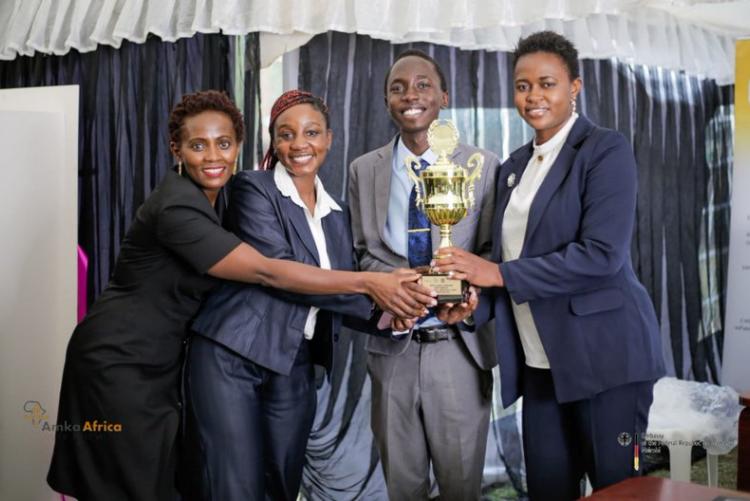The Faculty of Law recently achieved a remarkable victory at the Sexual and Reproductive Health Rights Moot Court Competition. This event, held at the Jomo Kenyatta University of Agriculture and Technology's School of Law, Karen Campus on September 29, 2023, was a platform where young legal minds came together to make a profound difference. The theme of this year's competition, "Influencing the Protection of the Sexual and Reproductive Health Rights of Intersex Persons in Kenya," had long been overlooked, but Amka Africa was determined to bring it to the forefront of the nation's legal discourse.
A dedicated team from the University of Nairobi's Faculty of Law, led by Ayaga Max and Barbra Ayimba, took center stage to champion the cause of intersex individuals in Kenya and ensure the protection of their sexual and reproductive health rights. Their exceptional performance earned them the prestigious Golden Medalist Trophy.
The FOL team not only secured the gold medal but also received accolades for Best Memorials in both the Applicants and Respondents categories, as well as recognition for Best Male and Female Oralists. Their case focused on alleged human rights violations against intersex individuals, particularly in the context of Sexual Reproductive Health Rights (SRHR). The team's in-depth research and well-crafted submissions highlighted the infringements on the SRHR of intersex individuals under both national and international law. They also scrutinized the state's failure to establish adequate regulatory and compliance measures, ultimately denying equitable protection under the law for this marginalized group.
During the competition, the team had the privilege of hearing from intersex individuals who shared their experiences, dispelling societal misconceptions about gender identity. Additionally, they were part of the official launch of the Amka Justice report on intersex individuals, titled "NOT BROKEN, DO NOT FIX." This report comprehensively documented the prevalence, nature, and consequences of medical, cultural, and religious practices aimed at "normalizing" or "converting" intersex individuals in Kenya.
The moot competition not only provided a platform for legal student competition but also served as a means to raise awareness about the rights of intersex persons. Misconceptions and myths about intersex individuals still persist in society, and this competition played a crucial role in dispelling them.
The University of Nairobi's Faculty of Law expressed their profound learning experience during the competition, particularly in the field of Sexual Reproductive Health Rights law. They plan to carry this knowledge forward as they consider careers in human rights protection. Additionally, they gained insights into organizing moot competitions and expressed their intention to collaborate with various organizations to host moots addressing emerging issues in Kenya and worldwide.
The team's arguments were based on international human rights standards, scientific evidence, and a deep understanding of the societal challenges intersex individuals face in Kenya. Their aim was not only to win the competition but also to raise awareness about the issues intersex people encounter daily.
The competition involved several rounds of intense debates, with teams from various universities showcasing their legal prowess. The Faculty of Law team's passion and commitment were undeniable as they passionately presented their case, challenging stereotypes and prejudices.
The victory of Ayaga Max, Barbra Ayimba, and their exceptional team was celebrated not only within the university but also across the nation. It served as a turning point in the discourse surrounding sexual and reproductive health rights in Kenya. Their story became an inspiring example of how the power of knowledge, passion, and dedication can transform the legal landscape and ensure justice for all, irrespective of their gender identity.
In the wake of this victory, the Kenyan government has also began taking steps to recognize and protect the rights of intersex individuals, thanks to the advocacy of Amka Africa. The University of Nairobi's Faculty of Law made a lasting impact, becoming role models for aspiring young lawyers who hoped to use their legal knowledge to effect positive change in society.

